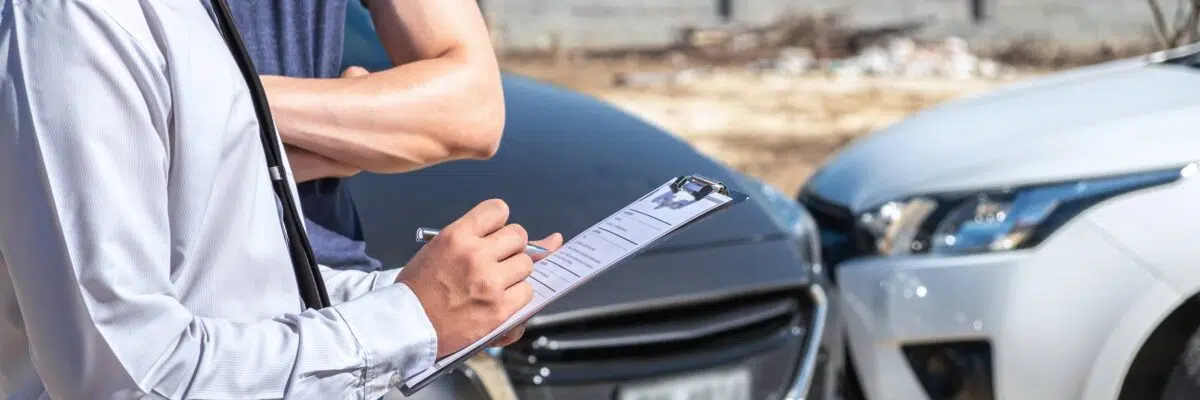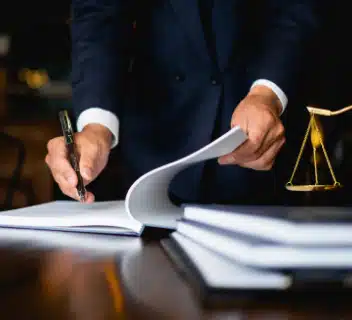Traffic Accident Attorney Near Me
Getting into a traffic accident can be one of the most overwhelming experiences in your life. Between physical serious injuries, vehicle damage, medical bills, and emotional distress, it’s easy to feel like you have nowhere to turn.
Fortunately, you don’t have to face these challenges alone when there are skilled car accident attorneys available. Searching for an experienced car accident lawyer is the first step toward getting the help and compensation you deserve.
An experienced traffic accident attorney can guide you through the legal process, fight on your behalf, and make sure your rights are protected. Whether you were involved in a minor fender-bender or a catastrophic collision related to motor vehicle accidents, knowing your legal options and having legal representation with an experienced auto accident attorney can make a huge difference.
In this guide, we’ll walk you through how to know if you have a claim, what compensation you might be entitled to, and why hiring a personal injury attorney is so important.
How Do I Know Whether I Have an Actionable Car Accident Claim Under the Law?

After a traffic accident, one of the very first questions people ask themselves is: Do I actually have a case?
It’s an important question—and one that can have a huge impact on your financial recovery, including lost wages, and peace of mind moving forward.
Legally speaking, to bring a successful car accident lawsuit, you must prove a few critical elements. If you can clearly establish these elements, then you likely have an actionable claim under the law. Let’s break it down carefully:
1. Duty of Care
In every car accident case, the starting point is whether the other driver owed you a duty of care.
Every driver on the road is required to operate their vehicle in a safe, responsible manner. This legal obligation is meant to protect everyone—drivers, passengers, bicyclists, and pedestrians alike.
Duty of care includes actions like:
- Obeying all traffic laws and posted signs
- Paying full attention to the road and surroundings
- Avoiding reckless or aggressive driving
- Maintaining proper speed for road and weather conditions
- Keeping a safe following distance
- Yielding the right-of-way when required
When drivers get behind the wheel, they automatically assume this duty of care. A violation of that duty, such as reckless driving, is the foundation of many successful car accident lawsuits. An experienced traffic accident attorney can evaluate whether the duty of care was breached in your case.
2. Breach of Duty
The next step is proving that the driver breached their duty.
In other words, they acted in a way that a reasonable and careful driver would not have.
Common examples of breach of duty include:
- Speeding: Going too fast for conditions or exceeding the legal speed limit
- Running a Red Light or Stop Sign: Ignoring traffic signals that are designed to keep intersections safe
- Distracted Driving: Texting, checking GPS, eating, or engaging in any activity that takes attention off the road
- Driving Under the Influence: Operating a vehicle after drinking alcohol or using drugs
- Tailgating: Following another vehicle too closely, leaving no room to stop safely
These actions aren’t just bad behavior—they are evidence of negligence that can form the backbone of a strong injury claim.
If you’re unsure whether the other party’s behavior, such as that of drunk drivers, qualifies as a breach, a traffic accident attorney near me can investigate the facts, obtain crucial evidence, and show exactly how the duty of care was violated.
3. Causation
Simply proving that the other driver was careless isn’t enough—you must also establish a direct connection between their misconduct and your injuries.
This element is called causation.
Causation requires showing that:
- The accident would not have happened but for the defendant’s negligence, and
- The defendant’s actions were a foreseeable cause of the crash and your injuries.
In practical terms, this means you have to prove that:
- If the other driver hadn’t been texting, they would have seen you stopping and avoided rear-ending your car.
- If the other driver hadn’t run the red light, they wouldn’t have broadsided your vehicle in the intersection.
- If the driver wasn’t speeding on slick roads, they wouldn’t have lost control and hit your car head-on.
A good traffic accident attorney near you can gather all necessary documentation—such as police reports, accident reconstruction expert opinions, and witness statements—to clearly demonstrate causation.
4. Damages
Finally, you must show that you suffered real, measurable damages, including medical treatment costs, as a result of the accident.
Damages can take many forms, including:
- Medical Bills: Costs of ER visits, hospital stays, surgeries, medications, physical therapy, and ongoing treatments.
- Lost Wages: Paychecks lost due to time off work while recovering from injuries.
- Loss of Future Earnings: If your injuries permanently limit your ability to work or advance in your career.
- Vehicle Repair Costs: Costs associated with fixing or replacing your car and any other property damaged in the accident.
- Pain and Suffering: Compensation for the physical pain, emotional trauma, and disruption to your life.
- Emotional Distress: Anxiety, depression, PTSD, or loss of enjoyment of life caused by the accident.
If you have any combination of these damages, you may be entitled to financial recovery through a car accident lawsuit.
An experienced traffic accident attorney near me will carefully document all your damages and fight to help you seek maximum compensation.
Why Proving These Four Elements Matters
In the world of car accident claims, proof is everything.
Even if you know the other driver was wrong, the legal system requires that you provide solid evidence for each element: duty, breach, causation, and damages.
Without clear, organized proof, insurance companies will look for reasons to deny your claim or minimize your payout.
That’s why hiring a trusted traffic accident attorney near me is so critical. They know how to gather the right evidence, present it effectively, and push back against lowball offers.
When you can clearly demonstrate all four legal elements, you not only strengthen your case—you also put yourself in a better position to negotiate a fair settlement without needing a lengthy court battle.
In short:
If you can prove that another driver owed you a duty of care, breached that duty, directly caused your injuries, and left you with real damages—you might have an actionable claim, depending on the facts of your case.
With the help of a traffic accident attorney near me, you can fight for the compensation you deserve and start rebuilding your life after a serious crash.
What is Negligence Per Se, and How Might It Apply to My Case?
Negligence per se is a legal concept that can make it easier for accident victims to prove fault.
Normally, to establish negligence, you have to show that the other driver acted unreasonably. But under negligence per se, if a driver violated a traffic law that was meant to protect people like you—and that violation caused your injury—then the driver is automatically considered negligent.
Example:
- If a driver runs a red light and crashes into your car, they have broken a law intended to prevent exactly that kind of accident.
- In this case, proving negligence per se means you don’t have to argue about whether the driver acted reasonably—the violation itself is enough.
Violations that could trigger negligence per se include:
- Speeding
- Running stop signs
- Drunk driving
- Distracted driving
- Failure to yield
A skilled legal team, including a traffic accident attorney near me, will analyze your personal injury case for potential negligence per se arguments. These claims can be powerful tools to hold the at-fault driver accountable and maximize your compensation.
Why Should I Hire a Traffic Accident Attorney?
Hiring an attorney after a traffic accident can make all the difference. Here’s what experienced personal injury lawyers, like a traffic accident attorney near me, can do for you:
- Investigate the Accident:
Gather police reports, witness statements, camera footage, and medical records. - Identify All Liable Parties:
Sometimes more than one party is responsible, such as other drivers, vehicle manufacturers, or even government entities. - Handle Insurance Negotiations:
Insurance companies are skilled at minimizing payouts. An attorney can negotiate aggressively for a fair settlement. - Calculate Damages:
You may be entitled to more compensation than you realize, including future medical expenses and emotional distress damages. - File a Lawsuit If Necessary:
If settlement negotiations fail, your lawyer can prepare your case for court and represent you through trial. - Protect You from Insurance Tactics:
Insurance adjusters may twist your words or pressure you into settling for less. Attorneys typically advocate for their clients’ rights. - Offer Peace of Mind:
Dealing with a legal case while trying to recover from injuries is stressful. Letting a professional handle it allows you to focus on healing.
When you’re searching for a traffic accident attorney near me, it’s important to find someone with experience, compassion, and a strong track record of success.
What Happens If I’m Partially At-Fault for My Traffic Accident Injuries?
One of the most confusing parts of any traffic accident claim is what happens if you share some of the blame.
Different states have different rules, generally falling into three categories:
1. Pure Comparative Negligence
- You can recover damages even if you are 99% at fault.
- However, your compensation is reduced by your percentage of fault.
Example:
If you are 30% at fault and win $100,000, you would receive $70,000.
2. Modified Comparative Negligence
- You can recover damages only if you are less than 50% or 51% at fault (depending on the state).
- If you are more at fault than the other party, you recover nothing.
Example:
If you are 40% at fault, you could recover 60% of your damages. If you are 55% at fault, you recover nothing.
3. Pure Contributory Negligence
- If you are even 1% at fault, you cannot recover any damages.
- Only a few states follow this harsh rule.
Example:
If the court finds you 1% responsible, you lose your right to compensation entirely.
A knowledgeable auto accident attorneynear me will evaluate your case carefully and fight to minimize any fault assigned to you.
How Much Am I Entitled to Receive as Compensation for My Traffic Accident Claim?
The value of your car accident claims for car accident victims depends on many factors. In general, you may be entitled to the following types of compensation in your personal injury claim :
Economic Damages
- Medical Expenses: ER visits, surgeries, physical therapy, prescriptions, medical equipment, future treatments.
- Lost Wages: Pay you lost from missing work, plus any future loss of earning capacity.
- Property Damage: Costs to repair or replace your vehicle and damaged belongings.
Non-Economic Damages
- Pain and Suffering: Compensation for physical pain and emotional distress.
- Loss of Enjoyment of Life: If injuries prevent you from hobbies, activities, or general daily life.
- Loss of Consortium: Impact of injuries on your relationships with family members.
Punitive Damages
In rare cases involving extreme recklessness (such as in a car crash due to drunk driving), the court might award extra damages to punish the defendant.
Finding auto accident lawyersnear me ensures your full range of damages and potential financial compensation is explored, calculated properly, and fought for aggressively.
How Long Do I Have to Sue If I Get into a Traffic Accident?
Each state sets its own deadlines—called statutes of limitations—for filing a traffic accident lawsuit based on car accident laws.
Typical Time Limits
- Personal Injury: Usually 2 to 3 years from the date of the accident.
- Property Damage: Often 2 to 3 years as well.
Exceptions to the Rule
- Delayed Discovery: If you didn’t realize you were injured right away, the clock might start when the injury is discovered.
- Minor Victims: If a minor is injured, they may have more time to file after turning 18.
- Government Defendants: If suing a government entity (like for poor road maintenance), you may have as little as 6 months to give notice.
Missing a deadline almost always means losing your right to sue. That’s why contacting a traffic accident attorney near me quickly is so important.
How Much Does a Traffic Accident Lawyer Cost to Hire?

Hiring car accident lawyersnear me is more affordable than many people think.
Contingency Fee Basics
- No upfront payment required.
- Your attorney only gets paid if you win your case.
- The typical contingency fee is 25% to 40% of your settlement or award.
Free Consultation
Most car accident lawyers work on a contingency fee basis and offer a free consultation to review your case, including your medical care needs, and explain your rights.
This system allows accident victims—who may already be struggling with medical bills and lost income—to get high-quality legal representation without financial risk.
Contact 1-800-THE-LAW2 for a Free Consultation
If you’ve been injured in a traffic accident, don’t wait to protect your rights. 1-800-THE-LAW2 can connect you with an experienced traffic accident attorney. A professional can help communicate with insurance companies and protect your rights.
- Get a free consultation today.
- No upfront costs.
- Only pay if your case is successful.
Call 1-800-THE-LAW2 to connect with an experienced traffic accident attorney in our network. They can review your case, help you understand your legal options, and explain what steps may come next. No upfront costs—just a free, confidential consultation.
Whether you need answers about fault, compensation, or the best way to handle insurance companies, a traffic accident attorney near me is ready to help you every step of the way.
Don’t let confusion or fear delay your claim. Your road to recovery starts with just one call. Speaking with a lawyer can make all the difference between receiving the compensation you deserve and having bills to pay, plus an injury to recover from.




